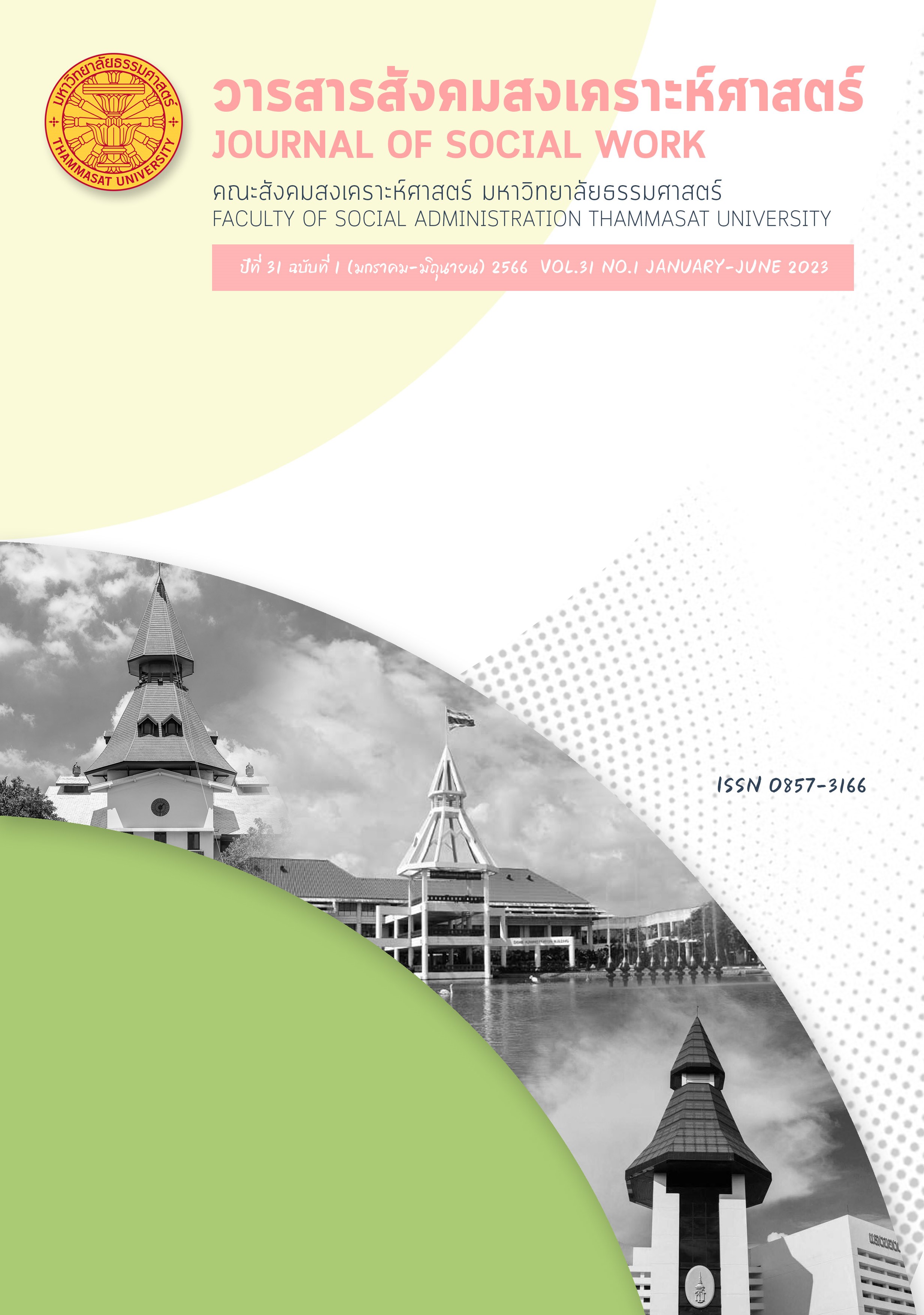Ideal Paradigm of Community Welfare Management Under the Social Capital Concept
Keywords:
Paradigm, Community welfare, Social capitalAbstract
This academic paper aims to propose an ideal paradigm of community welfare management under the social capital concept. It is mainly based on documentary research from various sources such as textbooks, academic journals, theses, as well as research. The author seeks to summarize and synthesize the collected information for designing an ideal paradigm. The results of this study point to a gap among theorists’ ideas in term of social capital principles which are based on trust, criticism, and collective resource management. The research thus establishes that the main challenge for formulating an ideal paradigm of community welfare management under the social capital concept is the integration of social capital ideas that relates to three key principles; 1) social capital principle based on trust is an important factor for promoting and supporting community welfare management, 2) social capital principle based on criticism with necessary debate and review should be emphasized for community welfare management process, and 3) social capital principle based on collective resource management is an important factor for all community members to be able to participate in creating and maintaining the rules for community welfare management.
References
กมลทิพย์ คงประเสริฐอมร. (2548). กระบวนการเรียนรู้ของชุมชนเพื่อการพัฒนาป่าชายเลนอย่างยั่งยืน: กรณีศึกษาตำบลบางขุนไทร อำเภอบ้านแหลม จังหวัดเพชรบุรี. ปริญญานิพนธ์ปรัชญาดุษฎีบัณฑิต, มหาวิทยาลัยธรรมศาสตร์. กรุงเทพฯ.
กรมการพัฒนาชุมชน. (2555). คู่มือการดำเนินงานโครงการหมู่บ้านเศรษฐกิจพอเพียงต้นแบบ. กรุงเทพฯ: บริษัท เท็กซ์ แอนด์ เจอร์นัล พับลิเคชั่น จำกัด.
กิติพัฒน์ นนทปัทมะดุลย์. (2550). ทฤษฎีวิพากษ์ในนโยบายและการวางแผนสังคม. ปทุมธานี: โรงพิมพ์มหาวิทยาลัยธรรมศาสตร์.
โกวิทย์ พวงงาม. (2553). การจัดการตนเองของชุมชนและท้องถิ่น. กรุงเทพฯ: บพิธการพิมพ์.
จุไรพร จิตพิทักษ์. (2559). 7 รูปแบบองค์กรสวัสดิการชุมชน ผู้สร้างสรรค์ความมั่นคง ตามแนวคิดของศาสตราจารย์ ดร. ป๋วย อึ๊งภากรณ์ “คุณภาพชีวิต ปฏิทินแห่งความหวังจากครรภ์มารดาถึงเชิงตระกอน”. กรุงเทพฯ: สถาบันพัฒนาองค์กรชุมชน (องค์กรมหาชน).
ชล บุนนาค. (2554). แนวคิดว่าด้วยการจัดการทรัพยากรร่วม: ประสบการณ์จากต่างประเทศและแนวคิดในประเทศไทย. กรุงเทพฯ: คณะกรรมการสมัชชาปฏิรูป.
ชล บุนนาค. (2561). ยังมีความหมาย: แนวคิดเรื่องชุมชนของ Elinor Ostrom กับเศรษฐกิจในศตวรรษที่ 21. เอกสารประกอบการบรรยายในหัวข้อ ยังมีความหมาย: แนวคิดเรื่องชุมชนของ Elinor Ostrom กับเศรษฐกิจในศตวรรษที่ 21, 8 ตุลาคม 2561 ณ คณะเศรษฐศาสตร์ มหาวิทยาลัยธรรมศาสตร์ ท่าพระจันทร์. กรุงเทพฯ: คณะเศรษฐศาสตร์ มหาวิทยาลัยธรรมศาสตร์.
ไทยรัฐออนไลน์. (2559). ขนสำนวนยักยอกออมทรัพย์คลองเปียะ 240 ล้าน-43 ผู้ต้องหา ส่งอัยการนาทวี, 30 กันยายน 2565. https://www.thairath.co.th/news/local/south/652629.
ธร ปีติดล. (2557). แนวคิดเรื่องชุมชนนิยมกับการสร้างเสริมเสรีภาพ. กรุงเทพฯ: มูลนิธิสาธารณสุขแห่งชาติ.
ผู้จัดการออนไลน์. (2558). จ.สงขลา สั่งตั้งกรรมการฟื้นฟู “กลุ่มออมทรัพย์คลองเปียะ” สถาบันการเงินชาวบ้านชื่อดังที่เคยถูกเชิดให้เป็นต้นแบบ ก่อนระบอบทักษิณลอกไปทำนโยบายกองทุนหมู่บ้าน หลังถูกคนในยักยอกเงินไปถึง 76 ล้าน จนปัญหาบานปลายสมาชิกเบิกถอนเงินไม่ได้ เผยมีการขอเรียนและแฉข้อมูล ถึงขั้นส่งเรื่องให้ DSI, 30 กันยายน 2565. https://mgronline.com/south/detail/9580000132732.
ระพีพรรณ คำหอม. (2551). รายงานศึกษาการสังเคราะห์องค์ความรู้การพัฒนารูปแบบการบูรณาการเครือข่ายกองทุนสวัสดิการชุมชนระดับอำเภอ 12 พื้นที่. กรุงเทพฯ: โรงพิมพ์เทพเพ็ญวานิสย์.
ระพีพรรณ คำหอม. (2557). สวัสดิการสังคมกับสังคมไทย. กรุงเทพฯ: ห้างหุ้นส่วนจำกัดสามลดา.
รุ้งนภา ยรรยงเกษมสุข. (2556). มโนทัศน์ชนชั้นและทุนของปิ แอร์บูร์ดิเออ. วารสารเศรษฐศาสตร์การเมืองบูรพา, 2(1), 29-44.
วัลลภัช สุขสวัสดิ์. (2557). แนวคิดทุนทางสังคมของโรเบิร์ต ดี พัตนัม และข้อท้าทาย. วารสารศรีนครินทรวิโรฒวิจัยและพัฒนาสาขามนุษยศาสตร์และสังคมศาสตร์, 6(11), 281-298.
สถาบันพัฒนาองค์กรชุมชน. (2552). คู่มือการดำเนินงานโครงการสนับสนุนการจัดสวัสดิการชุมชน. กรุงเทพฯ: โรงพิมพ์แอ๊ปป้า พริ้นติ้ง กรุ๊ป จำกัด.
สิริยา รัตนช่วย. (2560). การพัฒนาชุมชนท้องถิ่นภายใต้พลวัตรโลกยุคใหม่. วารสารการเมืองการปกครอง, 7(1), 72-87.
สุรางครัตน จําเนียรพล. (2555). สาระสําคัญจาก Robert D. Putnam Democracy and Social Capital: What’s the Connection?. วารสารวิจัยสังคม, 35(1), 1-21.
แสน กีรตินวนันท์ และสิริยา รัตนช่วย. (2562). กลไกการสร้างความเข้มแข็งสวัสดิการชุมชนเมือง กรณีศึกษา ชุมชนชาวไทยเกาะกลาง ชุมชนชาวจีนโบ๊เบ๊ ชุมชนคริสต์กุฎีจีน และชุมชนมุสลิมมัสยิดกามาลุลอิสลาม กรุงเทพมหานคร. วารสารสันติศึกษาปริทรรศน์. 7(5), 1253-1268.
อภิรดี วงศ์ศิริ. (2561). ทุนทางสังคมภายนอกชุมชน: การมีส่วนร่วมของประชาชนกับองค์กรปกครองส่วนท้องถิ่น. วารสารมนุษยศาสตร์สังคมศาสตร์. 3(35), 152-175.
อานันท์ กาญจนพันธุ์. (2559). ทุนทางสังคมกับการพัฒนาเมือง. นนทบุรี: มูลนิธิสถาบันสร้างสรรค์ปัญญาสาธารณะ.
Bourdieu, P. (1986). The Forms of Capital pp. 241-258 in Handbook of Theory and Research for the Sociology of Education, edited by J. G. Richardson. New York: Greenwood Press.
Bourdieu, P. (1997). The Forms of Capital in Halsey, A.H., H. Lauder, P. Brown and A.S. Wells (eds). Education: Culture, Economy, Society. Oxford: Oxford University Press.
Coleman, J. (1988). Social Capital in the Creation of Human Capital. The American Journal of Sociology, 94, 95-120.
Ostrom, E. 1990. Governing the Commons: The Evolution of Institutions for Collective Action. Cambridge: Cambridge University Press.
Ostrom, E. (2010). Beyond Markets and States: Polycentric Governance of Complex Economic Systems. American Economic Review, 100(3), 641-672.
Putnam, R. D. (1993). Making Democracy Work: Civic Traditions in Modern Italy. Princeton: Princeton University Press.
Putnam, R. D. (2000). Bowling Alone: The Collapse and Revival of American Community. New York: Simon & Schuster.
Downloads
Published
How to Cite
Issue
Section
License
Copyright (c) 2023 Journal of Social Work

This work is licensed under a Creative Commons Attribution-NonCommercial-NoDerivatives 4.0 International License.
The manuscripts published in the Social Work Journal is the copyright of the Social Work Journal, Thammasat University
Any article or opinion appeared in the Social Work Journal will solely be under the responsibility of the author The Faculty of Social Administration, Thammasat University and the editors do not need to reach in agreement or hold any responsibility.



